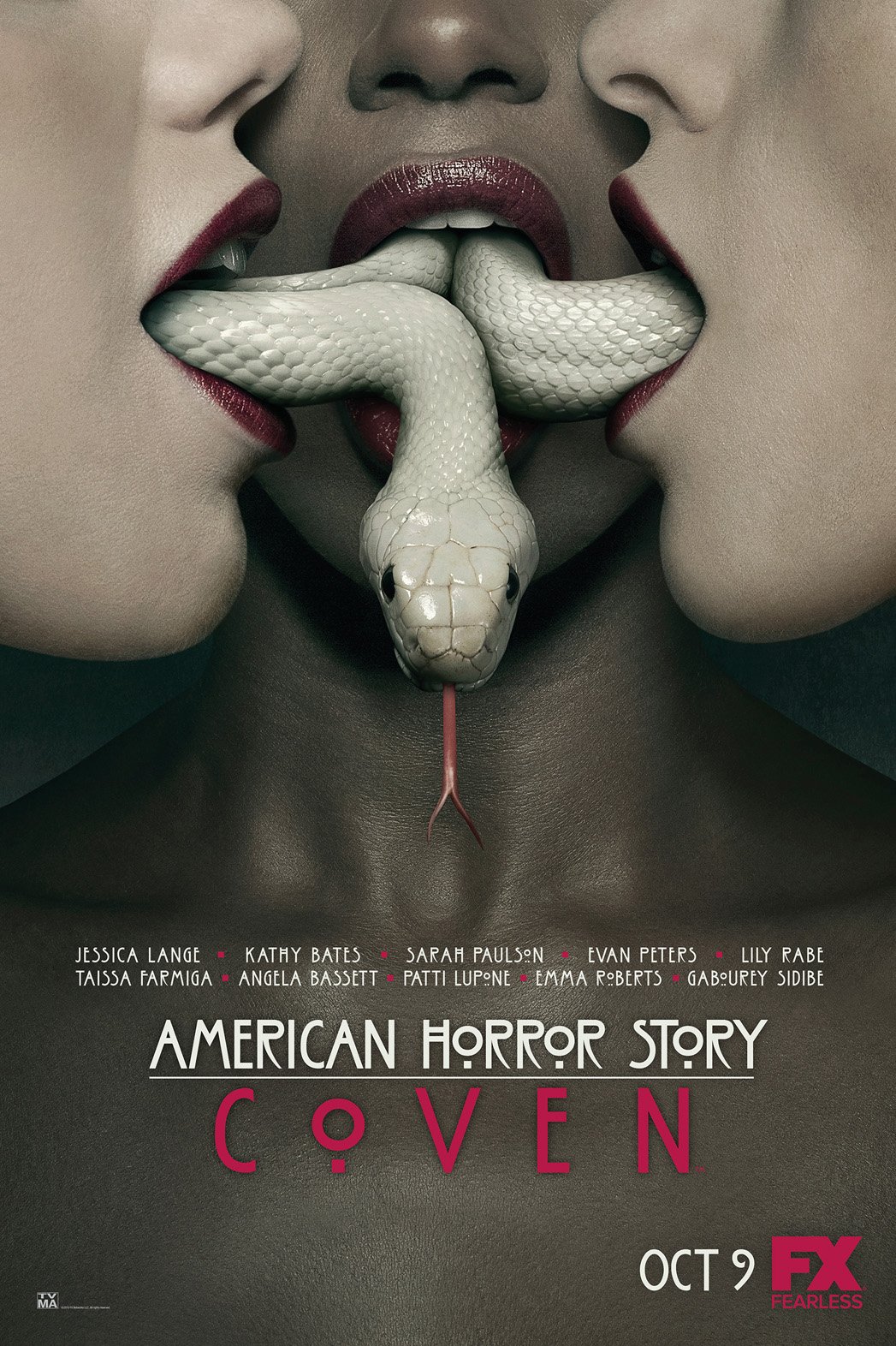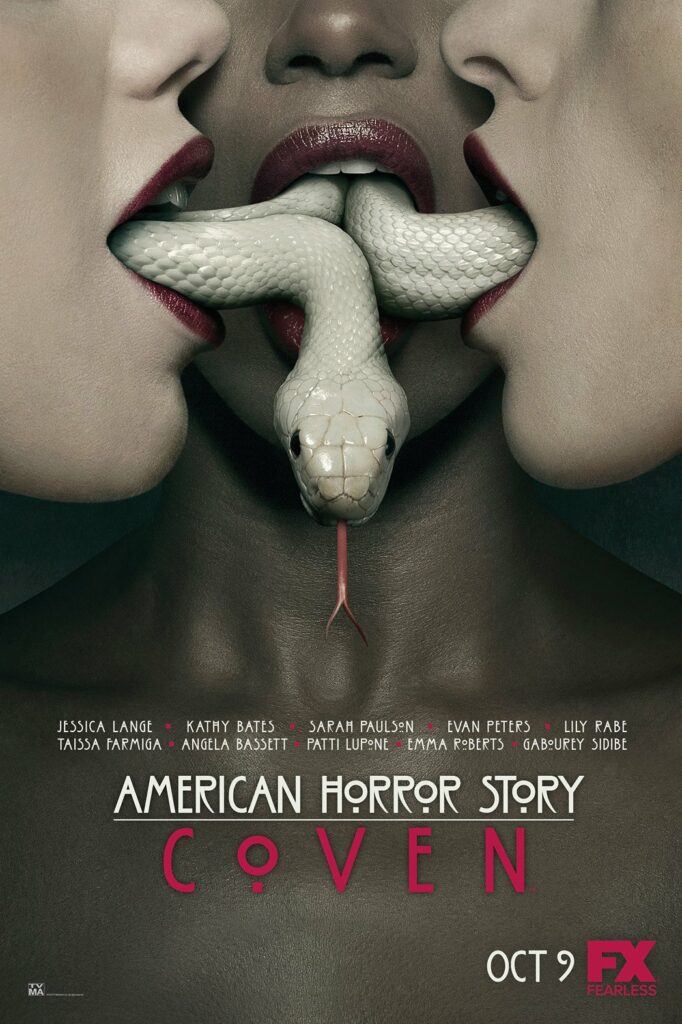Where Is The Magic In American Horror Story: Coven?
When it comes to FX’s twisted anthological miniseries American Horror Story: Coven, I must say that I have a relationship that is very love-hate-love, to borrow a line from an Alice in Chains song.
American Horror Story: Coven
Having binged upon the first two seasons of American Horror Story this past month (I fear Netflix might soon be the death of me), I can say without hesitation that this show is extremely top-notch from a writing, acting, and technical standpoint. Its star-studded repertory cast of Jessica Lange, Sarah Paulson, Evan Peters, Denis O’Hare, Zachary Quinto, and countless others is unwaveringly compelling and haunting to the last frame. The sheer holy crap-itude of what creators Ryan Murphy and Brad Falchuk have envisioned and brought to the screen is something telephiles and horror enthusiasts alike should be required to watch.
It’s easy to tell that Murphy and Falchuk have a deep and abiding love for horror, as their show is one that simultaneously plays with horror tropes and puts twists on them until they look like one of those corkscrew Cheetos (which I can’t find anywhere nowadays, a reality which is thoroughly mortifying). At the same time, the depths that American Horror Story is willing to go in terms of its drama, its themes, and its willingness to tackle heavy subjects like domestic disputation, mental illness, religion, and racism (just to skim a few off the surface) makes it unlike anything we’re seeing in horror today.
At this point, you’re probably wondering where the hate in my love-hate-love relationship comes into play. Let’s go with now.
While the show’s first two seasons, Murder House and Asylum, can be accurately described by the two dense paragraphs above, the third season, Coven, is an unfortunate outlier. My love for the show’s track record keeps me coming back to Coven, where I am routinely disappointed, but somehow I still find myself wanting more thinking it will get better.
In a nutshell, Coven tells the story of several witches who, because witches have constantly been in danger of extinction after the Salem Witch trials, attend a boarding school in New Orleans— Miss Robichaux’s Academy for Exceptional Young Ladies— to hone their respective powers and learn to survive in the modern world. Then add to the mix a longstanding cold war between the Salem witches and the voodoo community of New Orleans and wingardium levioSAH! You’ve got yourself a TV drama!
It’s essentially diet female X-Men with a voodoo twist (a soft drink I don’t think I’ll be swallowing anytime soon). Initially, I was fine with this conceit. I thought it would make for an almightily kick-ass ‘when worlds collide’-type scenario and, as a result, allow the leading ladies—Jessica Lange as the Supreme of the Coven (i.e. the Dumbledore of Miss Robichaux’s), Angela Bassett as the local voodoo queen, and Kathy Bates as a resurrected Southern debutante/racist, psychopathic witch— to showcase their uber-substantial acting chops as their characters jostled for control of their underworld.
As it turned out, I did not go hungry when it came to the uber-substantial acting chops showcase category. Lange, Bates, and particularly Bassett have all admirably portrayed and relished the power and the fear their characters possess as magical women living in 2013. I’ve also routinely enjoyed watching some of the supporting characters inside the school, namely Gabourey Sidibe’s performance as a human voodoo doll and the duality of Jamie Brewer’s character, a clairvoyant girl who also has Down syndrome.
However, the main problem with Coven is simply this: these tremendous talents have very thin material to work with and, as a result, have very little to do on screen. One would think that a show about witches with otherworldly powers living in an ordinary world would contain a great deal of on-screen goings on. If it spelled success for shows like Bewitched and Sabrina: The Teenage Witch, then a show like American Horror Story with its multi-faceted amazingliciousness just can’t fail, right? Wrong.
First off, this show and its creators have an obvious obsession with actress Jessica Lange, who has been a main fixture in all three seasons so far. Considering her Emmy-winning work in Murder House as Constance Langdon and her even better turn as Sister Jude in Asylum, who could blame them? Now, with Coven, it pains me to say that it’s time they got off the Lange bullet train, despite her Golden Globe and SAG award nominations for her role in Coven.
It’s easy to want to write good material for Lange to perform, but it also needs to be germane to whatever big picture the story is going for, which in Coven’s case seems to be the marginalization of witches in today’s society. This is not the case, as Lange’s character is annoyingly preoccupied with wanting to stay young, a plot thread feels wildly out of place with the rest of the story.
In Murder House and Asylum, Lange has played characters that appear dominant in their individual worlds, but are actually deeply broken on the inside. Without these characters, the big picture of the story would have suffered tremendously. With Fiona Goode, Lange’s character in Coven, I truly feel as though the Jenga tower of the story’s big picture would remain standing.
What damage has Fiona suffered? She’s old and she’s a sucky mom to Cordelia, one of the teachers at Miss Robichaux’s played by Sarah Paulson. Okay, but what else? That’s really about it. She’s just mean and nothing else. I don’t give a phosphorescent narwhal crap about what happens to her. If they made her more sympathetic, I might feel for her when she gets cancer and runs the risk of losing her role as Supreme of the Coven. Instead, her bout with cancer feels jarringly out of place and requires the writers to make room in the story for Danny Huston’s Axeman (one of several useless characters/plot elements aimlessly floating around Coven’s writers room) as a love interest for Fiona.
Secondly, Coven is surprisingly barren in its thematic content, the brunt of which seems to be made up of racism and gender roles. And while these are interesting subjects to tackle and has been the basis of the terrific on-screen pairing of Kathy Bates and Gabourey Sidibe, Coven is communion wafer-thin compared to its predecessors, the thickness of which is about on par with a gourmet filet mignon. I would venture to say that Asylum (the best season of the three, in my opinion) tackled racism more deftly in its first episode than Coven has in its entire season so far. And while we’re talking about Asylum, allow me to name some of the themes it explicitly dealt with in its first two episodes:
- Institutionalization
- Faith
- Mental illness and the sensitivity thereof
- Ethics in science, medicine, journalism, and exorcisms
- Sexual liberation in the eyes of the church
- Societal response to “abnormal” trends like homosexuality and interracial relationships
Almost instantaneously, my interest was captured and it increased exponentially until Asylum was complete. With Coven, my interest was briefly ensnared; though apparently with the captive capabilities of a Dollar Tree butterfly net because it escaped midway through episode two. Since then, it has yet to be captured for that long again. I’ve grown sick and tired of episodes being powered by scenes of petulant sardoodledom that masquerade as something new and intriguing. Come on, people! You’re witches!
It seems like the writers are trying to inject some bizarre sense of realism into Coven when that’s the complete wrong way to go about it. Witches are magical, damn it! Their magic makes them powerful and we only see it when it’s most convenient for the plot. NO! We need more! Have Jessica Lange turn that religious zealot next door into a garden gnome or something like that! I don’t care if it comes off as hammy! At this point, I’m all for that if it means the show will be more focused and fun to watch.
And that’s another thing: focus. Coven has none. It frequently becomes too sidetracked by subplots like Evan Peters’ reluctant frat-boy Frankenstein and Lily Rabe’s woodland Stevie Nicks roadie who also raises the dead. Had they just given Evan Peters the season off (a break that, after all the strife his character went through in Asylum, would be wholly deserved), the story would be much more focused in its structure.
Yet another huge structural problem with Coven is the seemingly endless parade of resurrections. A character will meet his or her end in some gloriously dramatic display of mystical carnage only to be brought back a short time later. This, in effect, completely defangs any sense of danger in the world of Coven. It’s just like that one time I tried playing Halo: a lot of yelling, a lot of dying, then respawn and repeat. When you boil it down to its essence, that’s Coven for you.
I’m still convinced it can be much more, especially considering Stevie Nicks’ upcoming cameo and the recent alliance between the Coven and Angela Bassett’s voodoo army against a new threat to modern magical women. I’ve heard that Ryan Murphy always saves the huge moments for the end, which has indeed been the case with Murder House and Asylum. So who knows? Maybe my heavily critical point of view will be magically transformed into a pile of love letters by season’s end! There’s only one way to find out: the newest episode of Coven airs tomorrow on FX at 10:00. Stay tuned for my review of said episode, which is called “The Magical Delights of Stevie Nicks.”


